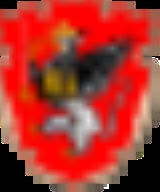
Livonian Voivodeship
Encyclopedia
The Inflanty Voivodeship , or Livonian Voivodeship , also known as Polish Livonia, was an administrative division and local government in the Polish–Lithuanian Commonwealth, since it was formed in the 1620s out of the Wenden Voivodeship
and lasted until the First Partition of Poland
in 1772. The Inflanty Voivodeship was one of the few territories of the Polish-Lithuanian Commonwealth to be ruled jointly by Poland and Lithuania.
The Inflanty Voivodeship, sometimes referred to the Principality of Inflanty after 1660 , was the minority remainder of the Duchy of Livonia
, which had been conquered by the Swedish Empire
during the Polish–Swedish War of 1621–1625.
The seat of the voivode was Dyneburg (Daugavpils
).
The name Inflanty is derived through Polonization
of Livland, the German
name for Livonia
. In modern times the region is known as Latgalia in the Republic of Latvia
.
Wenden Voivodeship
Wenden Voivodeship was a unit of administrative division and local government in the Duchy of Livonia, part of the Polish-Lithuanian Commonwealth, since it was formed in 1598 till the Swedish conquest of Livonia in the 1620s...
and lasted until the First Partition of Poland
Partitions of Poland
The Partitions of Poland or Partitions of the Polish–Lithuanian Commonwealth took place in the second half of the 18th century and ended the existence of the Polish–Lithuanian Commonwealth, resulting in the elimination of sovereign Poland for 123 years...
in 1772. The Inflanty Voivodeship was one of the few territories of the Polish-Lithuanian Commonwealth to be ruled jointly by Poland and Lithuania.
The Inflanty Voivodeship, sometimes referred to the Principality of Inflanty after 1660 , was the minority remainder of the Duchy of Livonia
Duchy of Livonia
The Duchy of Livonia was a territory of the Grand Duchy of Lithuania — and later the Polish–Lithuanian Commonwealth — that existed from 1561 to 1621...
, which had been conquered by the Swedish Empire
Swedish Empire
The Swedish Empire refers to the Kingdom of Sweden between 1561 and 1721 . During this time, Sweden was one of the great European powers. In Swedish, the period is called Stormaktstiden, literally meaning "the Great Power Era"...
during the Polish–Swedish War of 1621–1625.
The seat of the voivode was Dyneburg (Daugavpils
Daugavpils
Daugavpils is a city in southeastern Latvia, located on the banks of the Daugava River, from which the city gets its name. Daugavpils literally means "Daugava Castle". With a population of over 100,000, it is the second largest city in the country after the capital Riga, which is located some...
).
The name Inflanty is derived through Polonization
Polonization
Polonization was the acquisition or imposition of elements of Polish culture, in particular, Polish language, as experienced in some historic periods by non-Polish populations of territories controlled or substantially influenced by Poland...
of Livland, the German
German language
German is a West Germanic language, related to and classified alongside English and Dutch. With an estimated 90 – 98 million native speakers, German is one of the world's major languages and is the most widely-spoken first language in the European Union....
name for Livonia
Livonia
Livonia is a historic region along the eastern shores of the Baltic Sea. It was once the land of the Finnic Livonians inhabiting the principal ancient Livonian County Metsepole with its center at Turaida...
. In modern times the region is known as Latgalia in the Republic of Latvia
Latvia
Latvia , officially the Republic of Latvia , is a country in the Baltic region of Northern Europe. It is bordered to the north by Estonia , to the south by Lithuania , to the east by the Russian Federation , to the southeast by Belarus and shares maritime borders to the west with Sweden...
.
Voivodes
This is a list of the voivodes for Inflanty:- Jerzy FarensbachJürgen von FarensbachJürgen von Farensbach was a Baltic German nobleman and Livonian general. Sent as the Ambassador of Livonian Confederation to Czar Ivan IV of Russia, for concluding a peace treaty, he entered the Russian service and won the battle on Oka against the Tatars on August 1, 1572...
- Maciej Demblński
- Krzysztof Słuszka
- Teodor Doenhoff
- Joachim Tarnowski
- Tomasz Sapieha
- Paweł Sapieha
- Mikołaj Korft
- Przecław Leszczyński
- Alexander Morszlyn
- Jan Teodor
- Jerzy Płatem
- Otto Fryderyk Felkierzamb
- Jan Koss
- Jędrzej Głębocki
- Piotr Przebendowski
- Antozi Morsztyn
- Wilhelm Płatem
- Jan Borch
- Stanisław Brzostowski
- Jozafat (Jan) Zyberg
- Gaspar Rogaliński
- Adam Falkierzamb

